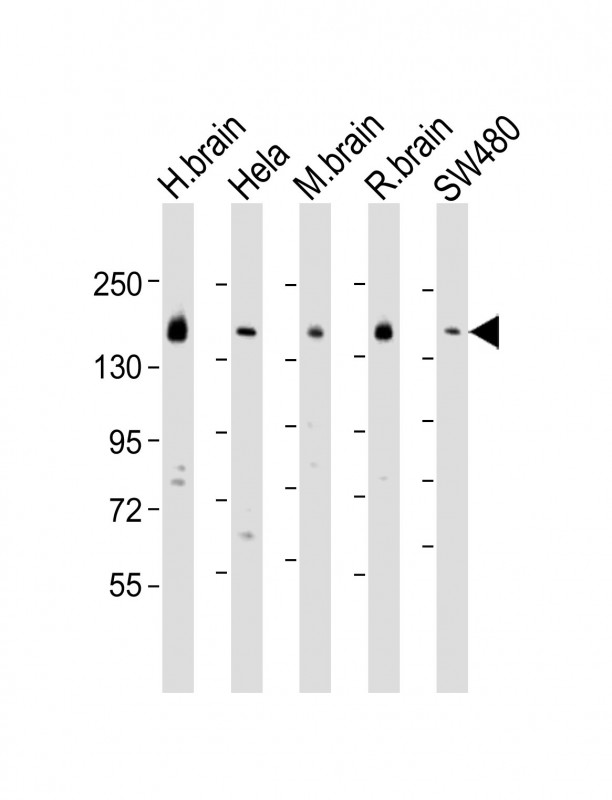
| WB | 1/1000-1/2000 | Human,Mouse,Rat |
| IF | 咨询技术 | Human,Mouse,Rat |
| IHC | 咨询技术 | Human,Mouse,Rat |
| ICC | 技术咨询 | Human,Mouse,Rat |
| FCM | 咨询技术 | Human,Mouse,Rat |
| Elisa | 咨询技术 | Human,Mouse,Rat |
| Aliases | Synaptojanin-1, Synaptic inositol 1,5-trisphosphate 5-phosphatase 1, SYNJ1, KIAA0910 |
| Entrez GeneID | 8867 |
| WB Predicted band size | 173.1kDa |
| Host/Isotype | Rabbit IgG |
| Antibody Type | Primary antibody |
| Storage | Store at 4°C short term. Aliquot and store at -20°C long term. Avoid freeze/thaw cycles. |
| Species Reactivity | Human, Mouse, Rat |
| Immunogen | This SYNJ1 antibody is generated from a rabbit immunized with a KLH conjugated synthetic peptide between 1148-1182 amino acids from the C-terminal region of human SYNJ1. |
+ +
以下是关于SYNJ1抗体的3篇参考文献示例(注:以下内容为模拟示例,实际文献请通过学术数据库查询):
---
1. **文献名称**: "SYNJ1 mutations cause autosomal recessive early-onset Parkinsonism"
**作者**: Krebs CE, et al.
**摘要**: 该研究通过全外显子测序发现SYNJ1基因突变与早发性帕金森病相关,并利用SYNJ1抗体进行Western blot和免疫组化分析,证实患者脑组织中SYNJ1蛋白表达显著降低,提示其功能缺失可能导致突触功能障碍。
---
2. **文献名称**: "Synaptojanin 1-mediated endosomal trafficking regulates amyloid precursor protein processing"
**作者**: McIntire LBJ, et al.
**摘要**: 研究探讨SYNJ1在阿尔茨海默病中的调控作用,通过SYNJ1抗体检测神经元中蛋白定位,发现其通过影响内吞途径调节淀粉样前体蛋白(APP)的加工,提示SYNJ1缺陷可能加剧β淀粉样蛋白沉积。
---
3. **文献名称**: "Impaired synaptic vesicle recycling in SYNJ1 knockout mice"
**作者**: Cremona O, et al.
**摘要**: 利用SYNJ1抗体在基因敲除小鼠模型中验证蛋白缺失,发现突触小泡循环异常,导致神经递质释放障碍,支持SYNJ1在维持突触功能中的关键作用。
---
如需具体文献,建议通过PubMed或Google Scholar以关键词“SYNJ1 antibody” + “Parkinson’s”/“Alzheimer’s”/“synaptic vesicles”检索最新研究。
Synaptojanin 1 (SYNJ1) is a polyphosphoinositide phosphatase critical for synaptic vesicle recycling and intracellular membrane trafficking. It hydrolyzes phosphatidylinositol-4.5-bisphosphate [PI(4.5)P2] to regulate clathrin-coated vesicle uncoating and membrane dynamics, particularly in neuronal synapses. SYNJ1 interacts with endocytic proteins like endophilin, facilitating synaptic transmission and maintaining neuronal homeostasis. Dysregulation of SYNJ1 is implicated in neurological disorders, including early-onset Parkinson’s disease (PD) and Alzheimer’s disease (AD). Homozygous SYNJ1 mutations are linked to autosomal recessive PD, while heterozygous variants may contribute to late-onset PD. SYNJ1 deficiency in models leads to synaptic dysfunction, accumulation of PI(4.5)P2. and neurodegeneration, highlighting its role in neuropathology.
SYNJ1 antibodies are essential tools for studying these mechanisms. They enable detection of SYNJ1 expression, localization, and post-translational modifications in brain tissues or cell lines via techniques like Western blot, immunohistochemistry, and immunofluorescence. Researchers use these antibodies to explore SYNJ1’s involvement in synaptic plasticity, vesicle recycling, and disease pathways. Commercially available SYNJ1 antibodies vary in specificity, targeting different isoforms (e.g., the neuronal isoform SYNJ1-145 kDa or the ubiquitously expressed SYNJ1-149 kDa). Validation includes knockout controls to ensure accuracy. Such antibodies aid in elucidating SYNJ1’s contribution to neurodegenerative diseases and potential therapeutic targets. Additionally, SYNJ1 antibodies are utilized in diagnostic research to assess protein levels in patient-derived samples, correlating with disease progression or genetic mutations.
×